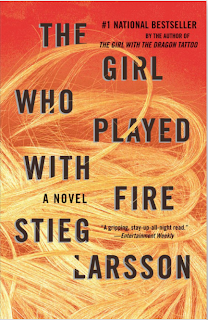"The Girl Who Played with Fire" by Stieg Larsson
The second book in his Millennium trilogy, Stieg Larsons’ The Girl Who Played with Fire, picks off sometime after The Girl with the Dragon Tattoo ended, with Mikael Blomkvist attempting to expose a sex trafficking operation. However, things quickly take turn for the worse as the reporters who were supposed to write the article were murdered, and what’s worse the fingerprints on the murder weapon are those of his friend, Lisbeth Salander.
Naturally, it will take much more than that to convince Mikael that she is indeed the killer, and so he takes it upon himself to run an investigation in order to clear her name, find the real culprit, and take expose the trafficking ring. On her end, Lisbeth is herself drawn into a real game of cat and mouse against the police, which ultimately will force her to confront her dark and disturbed past.
Touching on a large number of themes and moral questions, the second part of this trilogy may not have been received as well as the first one, but it sure has left a mark on its readers with a barrage of murders, betrayals and deceptions lurking at every corner.
 | Stieg Larsson
|







Comments
Post a Comment